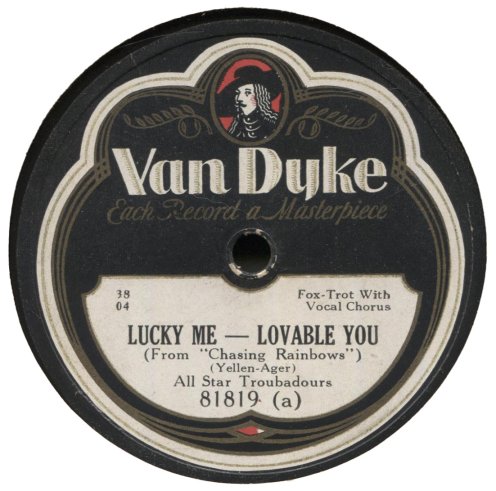
“Blue Ridge Blues”
White Way Players
(Van Dyke 81819 B mx 3713) November, 1929
“Lucky Me Lovable You”
All Star Troubadours; Smith Ballew, vocal
(Van Dyke 81819-A mx 3804) December 27, 1929
Here are two sides from a Van Dyke record from the Edward Mitchell collection.
Van Dyke was one of several subsidiary labels of Grey Gull, a low-priced label based out of Boston. Records manufactured by Grey Gull are notorious for being made out of poor-quality material. Even in new condition, they tend to be noisy, and since they wore out quickly, it is not uncommon for them to turn up in almost unplayable condition. This particular record is in pretty decent condition compared to most records on the Grey Gull labels I have come across.
Grey Gull began recording electrically in 1926 and, as with the materials the records were made out of, the audio engineering and fidelity on their electrical recordings were often lower than average in quality.
The Van Dyke label was introduced late in Grey Gull’s existence and was only made between 1929 and 1930 when Grey Gull went out of business. Recordings on Van Dyke duplicated those issued on other Grey Gull labels, though the pseudonym used on the artists’ credit sometimes differed from label to label.
Despite the records’ often poor technical quality, many interesting recordings can be found on the Grey Gull labels. As a result of the company’s efforts to cut costs as much as possible, one can find songs that were never recorded or performed elsewhere.
Record labels were required to pay a per-copy royalty to the music publishers for every copyrighted musical composition they sold. To save on royalty expenses, Grey Gull often placed a well-known popular song for which it had to pay royalties on the A-side of a record and used a song written by one of its in-house composers on the B-side. Because such compositions were never published other than through the recordings, they were not available for the various bands of the era to perform, nor were they recorded by other record labels.
One of those in-house composers was trumpet player Mike Mosiello, who wrote “Blue Ridge Blues” and several other songs for the label. The band which performs it was Grey Gull’s in-house studio band, of which Mosiello was a member. In addition to Mosiello, that band typically included Andy Sanella, and Charles Magnante who were, on occasion, joined by Joe and/or George Hamilton Green and future bandleader Tommy Dorsey.
On this Van Dyke copy, that band is credited under the pseudonym White Way Players. However, on parent label Grey Gull, it was credited under the pseudonym of the Jazzopators.
“White Way” is a reference to “The Great White Way,” a then commonly used nickname for New York City’s Broadway theater district resulting from the area’s many impressive electrically illuminated advertising signs.
Several other songs over the years have shared the title “Blue Ridge Blues.” Musical compositions can be copyrighted, but their titles cannot.
“Lucky Me Lovable You” was composed for the talking picture Chasing Rainbows, which was filmed in 1929 but not released to theaters until 1930. The most famous song from that movie was “Happy Days Are Here Again,” which is still well-known. Because of the delay in the film’s release, all of its songs were already published, recorded and being performed on radio broadcasts well before it appeared in theaters.
The band on this recording is the California Ramblers issued here on Van Dyke under the pseudonym of the All Star Troubadours. On parent label Grey Gull, the recording was credited under the pseudonym of the White Way Serenaders.
The uncredited vocal here is provided by Smith Ballew who, in addition to being a successful early 1930s bandleader who later went on to star in several “singing cowboy” B-Westerns, worked on the side as a studio vocalist for most of the era’s record labels. In that capacity, he appeared on several hundred records issued between 1929 and 1935. If you tune in to Radio Dismuke it won’t be too long before you will hear his voice.
The California Ramblers did not record exclusively for any particular label; thus, their recordings can be found under various pseudonyms on many of the labels in existence during the 1920s and early 1930s.
This was not the only California Ramblers recording of “Lucky Me Lovable You.” They recorded a slower tempo arrangement on Columbia under the pseudonym of Ted Wallace and His Campus Boys, also with Smith Ballew on the vocal. They recorded another version under the pseudonym of the Golden Gate Orchestra for Columbia’s low-priced subsidiary labels Harmony, Diva and Velvet Tone, which, at the time, were still using the obsolete pre-microphone recording equipment that their parent label stopped using in 1925 when it switched over to recording electrically. Irving Kaufman provided the vocal on that recording.
I tend to include recordings from the Grey Gull labels that I might otherwise pass over for inclusion in Radio Dismuke’s playlist simply because many are somewhat obscure, even among collectors, and most have not been reissued in modern formats.
– Dismuke
